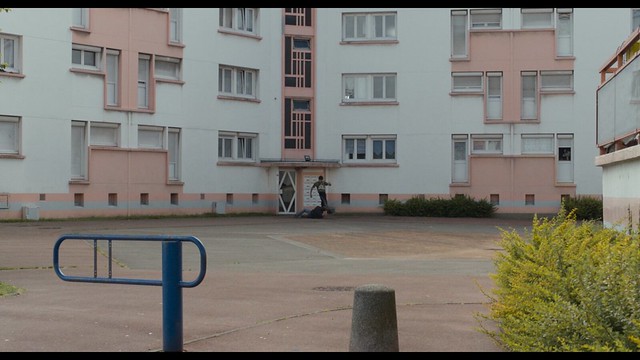





 Unlike its ironic title in Michael Haneke's searing portrayal of bourgeois French family, no one is quite happy with their lives. An aging patriarch of the house Laurent (Jean-Louis Trintignant) is quietly suicidal with his failing body and early Alzheimer’s. His daughter Anne (Isabelle Huppert), the head of the family construction business, is facing a lawsuit by a worker involved in an accident at one of the construction sites, which is shown in CCTV camera in the beginning of the film, and her grown up son Pierre (Franz Rogowski) is not good at anything and not ambitious enough for her despite all the pestering. His son Thomas (Mathieu Kassovitz), a surgeon, is having an illicit sexual affair with a musician while neglecting his second wife and a newborn baby. Then there is Eve (Fantine Harduin), a thirteen-year-old girl from Thomas's first marriage. She comes to live with the Laurents after her mother is hospitalized for poisoning (Eve secretly poisoned her mother and recorded the process on her phone for amusement).
Unlike its ironic title in Michael Haneke's searing portrayal of bourgeois French family, no one is quite happy with their lives. An aging patriarch of the house Laurent (Jean-Louis Trintignant) is quietly suicidal with his failing body and early Alzheimer’s. His daughter Anne (Isabelle Huppert), the head of the family construction business, is facing a lawsuit by a worker involved in an accident at one of the construction sites, which is shown in CCTV camera in the beginning of the film, and her grown up son Pierre (Franz Rogowski) is not good at anything and not ambitious enough for her despite all the pestering. His son Thomas (Mathieu Kassovitz), a surgeon, is having an illicit sexual affair with a musician while neglecting his second wife and a newborn baby. Then there is Eve (Fantine Harduin), a thirteen-year-old girl from Thomas's first marriage. She comes to live with the Laurents after her mother is hospitalized for poisoning (Eve secretly poisoned her mother and recorded the process on her phone for amusement).
New technologies always figure into Haneke's films and this time around, it's smart phones and the internet. Eve's incessant YouTube watching of very mean boys doing evil things and Thomas's explicit sexting with his mistress which Eve has no problem excessing. The smartphone video footage bookends the film.
Even though everyone's living under the same roof, they are all living their separate, secretive lives and no one's talking to each other about anything, least of all, their feelings. When they try, like Anne confronts Pierre and Thomas does Eve, they miserably fail. The old Laurent drives out of the house in the middle of the night and crashes his car intentionally into a pole with the full intention of killing himself but ends up with a broken ankle and bruises and ends up in a wheelchair. Everyone automatically accepts that the old man is losing his marbles slowly. In this well-mannered 1st world society, everyone is too polite to air their grievances or their problems out loud. They'd rather suffer internally. No dramatics, no heart-to-heart, no sentimentality. It is funny then, that Laurent ends up confiding his dilemma to his old barber in an attempt to get him a gun so he can commit suicide. The horrified barber refuses. OK OK, see you next time. And it's the 1st world/third world, haves/and have-nots dichotomy Haneke utilizes so skillfully: Laurent's long-time caretakers are a Muslim couple. We don't know anything about them other than their very servile attitudes. We don't know if they had a young daughter until she gets mauled by the family German Shepherd.
Haneke also uses wordless scenes in wide shots to demonstrate what's lost in translation. Pierre goes to an apartment building where supposedly the victim of the construction accident lives. He is there probably to apologize. But he only gets shit kicked out of him. A group of African immigrants make appearances in two different scenes: one with the old Laurent confronting them in his wheelchair on the street, seemingly bargaining them with his wristwatch for killing him off while a white onlooker mistaking them for thugs harassing an old man. Later, the same group of people show up on Laurent's birthday brought on by Pierre, intentionally trying to make a scene, introducing them to the party guest, as he awkwardly attempts to humanize them. The Laurents are the definition of self-righteous white liberals.
It falls on the old Laurent and Eve to connect over their killing tendencies. He confesses that he suffocated his aging wife in a mercy killing and Eve semi-confesses that she once poisoned her classmate in the camp. In a way, Happy End is a sequel or extension to Haneke's extremely affecting Amour and an affirmation of his advocation for having a choice to end life. Acting is superb all around. Great to see Haneke utilizing the great Franz Rogowski and his physicality here. Rogowski's acrobatic karaoke scene is that of end dancing scene in Beau Travail with Denis Lavant. Good to see Toby Jones as Anne's British love interest as well. But it's the late Trintignant who steals the show. His scene with young Harduin is so good. Bleak in the assessment of our present society which is grooming a generation that lacks empathy, Happy End is in line with such great Haneke films as Code Unknown and Benny's Video and just as strong.
No comments:
Post a Comment